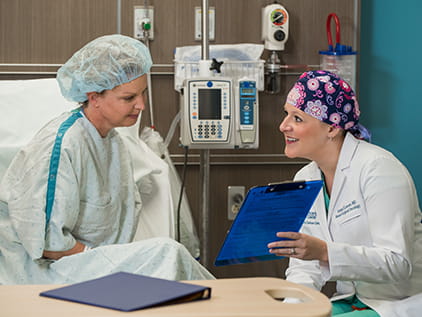Neurorehabilitation
Recovering physical, mental and functional strength after a stroke, spine or brain injury, or brain cancer can be a significant challenge. The first few weeks after injury are critically important to recovery.
Our expert neurorehabilitation team helps make the most of this important timeframe. The team of physiatrists and therapists – including physical, occupational and speech therapists – helps you reclaim independence and return home following neurological injury.
What is neurorehabilitation?
Neurorehabilitation promotes your continued recovery – improving strength and cognitive abilities following a neurological injury. The goal is to help you reclaim independence and return home safely using a personalized combination of medical, nursing and therapeutic care.
We offer a variety of appointment types. Learn more or call 913-588-1227 to schedule now.
Who can have neurorehabilitation?
You may require neurorehabilitation care following stroke, spine injury or traumatic brain injury. You may benefit from our inpatient rehabilitation services if you:
- Are medically stable to tolerate therapy
- Have a medical condition that requires a doctor's attention daily
- Require 24-hour nursing care
- Show potential to re-enter and thrive in your community
Who is the neurorehabilitation team?
Neurorehabilitation is a collaborative effort among several specialists. It may include many different types of therapies and treatments, depending on your needs.
Your neurorehabilitation team may include:
- Doctors who specialize in physical medicine and rehabilitation
- Nurses trained to address bowel and bladder function, skin integrity and pain
- Occupational therapists who help you relearn daily living skills
- Physical therapists who work to restore mobility, strength and endurance
- Social workers and case managers who coordinate with the care team and assist with insurance questions as well as discharge and follow-up services
- Speech therapists who help you improve communication, cognition and swallowing
- A dedicated pharmacist to provide proper medication oversight
- A neuro rehab psychologist who identifies the effects of neurological conditions on cognition and mood
- Therapeutic recreational therapists who provide therapeutic social and recreational activities incorporating your rehabilitation goals

Cancer care you can count on
The University of Kansas Cancer Center is 1 of fewer than 60 NCI-designated comprehensive cancer centers in the nation, and it's part of The University of Kansas Health System.
Benefits of neurorehabilitation
Neurorehabilitation has many benefits and can address a wide range of needs. The program includes a focus on:
- Family support and education
- Improving communication, such as speaking and reading
- Mastering daily tasks, such as eating, bathing, dressing and toileting
- Strength-building, muscle control, walking or other means of mobility
What happens during neurorehabilitation?
Inpatient neurorehabilitation generally follows a hospital stay. Our patients see a physician with specialized training in rehabilitation and receive 3 hours of therapy daily. Our team provides support to help each person improve abilities, build confidence and increase independence.
Each person has a unique discharge plan. Our expert clinicians collaborate to address every facet of your needs during recovery.
One crucial factor for successful recovery is the involvement of loved ones. We understand that support is a key component to positive outcomes. We are committed to training and educating loved ones on becoming confident caregivers.
We strive to send you home to safely care for yourself. From nutrition to wheelchair transfers to bathing support, we partner with you and your loved ones to create a customized plan to continue home care with confidence.
Why choose us for neurorehabilitation
We take an interdisciplinary, team approach to neurorehabilitation care. Our team includes clinicians whose collaborative approach ensures we address all your needs for recovery.
This strategy has helped us achieve discharge-to-community rates above 80%.
As an extension of the neurology and neurosurgery team, we deliver an important advantage. We provide consultations by rehabilitation physicians while patients are still in the acute care hospital. Early involvement of rehabilitation specialists in the care process helps to prepare us to work toward your recovery goals sooner. In addition, all services from the main hospital are available 24 hours per day, 7 days per week on the Acute Inpatient Rehabilitation Unit.
Specialized programs and specialties
Spinal cord injury (SCI) program
We provide a highly structured program for persons with acute or chronic SCI. This includes individuals with spinal dysfunction due to traumatic injury resulting from motor vehicle accidents, falls, assault, sports or recreational activities and from a nontraumatic condition, such as tumors, infection, cervical stenosis with resulting weakness or surgery related to the spine.
Patients with complete or incomplete injuries at the spinal level of C4 (cervical vertebrae #4) and below may be accepted into the program, except those who are ventilator dependent.
Additional patient populations, including those with multiple sclerosis, Guillain-Barré syndrome and spine-related neurological conditions may be considered for admission.
Individuals who have suffered from a spinal cord injury may exhibit any of the following:
- Arm and/or leg weakness (up to 4 extremities)
- Sensation changes
- Decreased mobility or ability to perform activities of daily living
- Changes in muscle tone
- Bladder and/or bowel incontinence
- Decreased respiratory function
- Altered blood pressure
Our interdisciplinary team provides education and support to address each patient's needs, including bladder, bowel and respiratory function, mobility, skin integrity, neuropathic pain, nutrition, cognition, emotional, behavioral and sexual concerns.
Stroke program
Our team focuses on the complex needs of individuals who have experienced a recent or previous ischemic stroke (when blood flow to the brain is blocked) or hemorrhagic stroke (bleeding in the brain).
Individuals who have suffered from a stroke may exhibit any of the following:
- Weakness on one or both side(s) of the body
- Sensation changes
- Changes in muscle tone
- Decreased mobility or ability to perform activities of daily living
- Difficulty communicating or swallowing
- Decreased safety awareness
- Changes in mood
- Changes in vision
- Altered cognition
The interdisciplinary team provides education and support to address each patient's needs, including bladder, bowel, mobility, communication, neuropathic pain, safe positioning, swallowing, cognition, vision and emotional concerns.
Brain injury program
Our team focuses on the rehabilitation needs of patients who have experienced an acquired brain injury, including traumatic and nontraumatic causes. Traumatic brain injuries are most often caused by falls, motor vehicle accidents, assault, etc. Nontraumatic brain injuries can occur in various ways, including anoxia (lack of oxygen), brain tumors, infection, etc.
Individuals who have sustained a brain injury may exhibit any of the following impairments:
- Weakness
- Coordination difficulty
- Sensation changes
- Decreased mobility or ability to perform activities of daily living
- Changes in muscle tone
- Difficulty communicating or swallowing
- Changes in vision
- Decreased safety awareness
- Changes in mood or behavior
- Changes in cognition
Our interdisciplinary team provides education and support to address each patient's needs, including mobility, cognition, safety, communication, vision and behavior management.

Resources for stroke patients and caregivers
When you or someone you love has a stroke, you don’t have to go through it alone. Programs and support are available through local and national organizations and right here at the health system.







